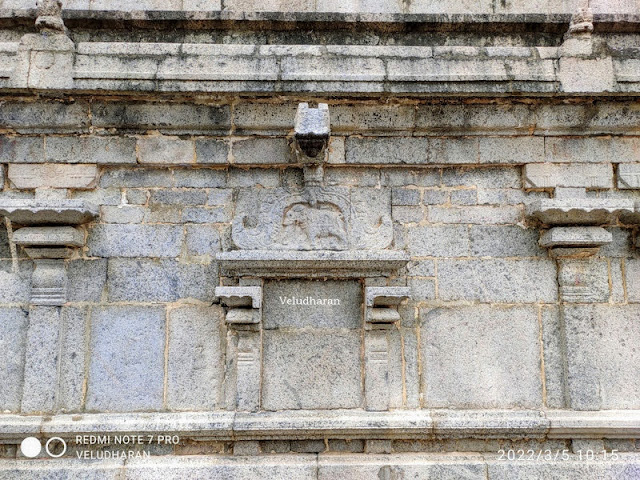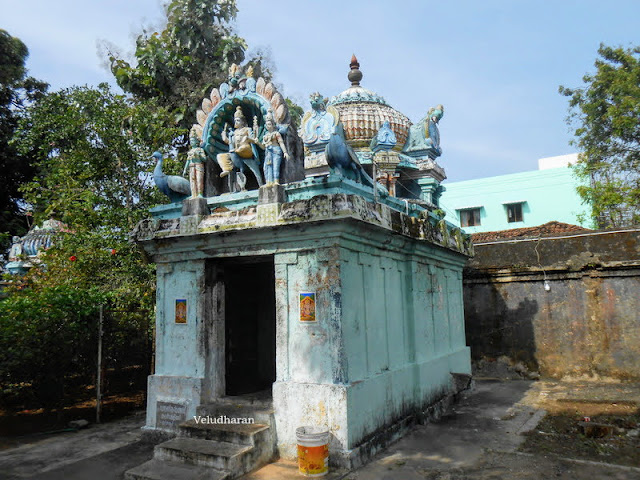The Heritage visit to this Sri Adhi Kayarohaneshwarar
Temple near LIC, Sabam Theertha
Vinayagar alias Kakka Kulam Pillayar
Temple at Nagapattinam in Nagapattinam
District was a part of “Mada Temples Heritage Walk in Nagapattinam and
Mayiladuthurai Districts”, organized by “Chozha Mandala Varalatru Thedal Kuzhu
– GCHRG, on 05th and 6th March 2022. This temple is about 750 meters from Sri
Neelayadhakshi Kayarohaneswarar, one of the 276 Thevara Paadal Petra Shiva
Temples. Thanks to V Ramachandran, Thasildar of Nagapattinam, who took us to
all these Temples. The temple complex consists of Sattayappar Temple, a Mada
temple, and the Sri Adhi Kayarohaneswarar temple with Common parivara deities.
Moolavar: Sri Adhi Kayarohaneshwarar
Consort : Sri Adhi Neelayadhakshi Amman
Some
of the salient features of this temple are….
The
temple faces east with a 3-tier Rajagopuram. Rishabam and balipeedam are in
front of mukha mandapam. Moolavar in the
sanctum sanctorum is on a vesara avudayar. Dwarapalakas are at the entrance of the sanctum sanctorum. Saneeswaran is on the
north side of the entrance. In koshtam Vinayagar, Dakshinamurthy, Lingothbavar,
Brahma, and Durgai. Ambal is in a separate sannidhi with abhaya varada hastam, and her upper hands are holding accamala and a flower bud.
The parivara sannidhis in the praharam are (Common
for both temples) Chandikeswarar, Ayyanar, Maha Ganapathi, Sri Valli Devasena
Subramaniyar, Gajalakshmi, Saraswati, Nagars under Peepal tree, Navagrahas,
Suryan, Thirugnanasambandar in dancing posture, and Bairavar.
ARCHITECTURE
The
Temple consists of the sanctum sanctorum, antarala, ardha mandapam, maha mandapam, and muka mandapam. The Mandapam, before the sanctum sanctorum and Ambal Sannidhi, has entrances on three sides. The center entrance is connected to the mukha
mandapam. Balipeedam and Rishabam are at the mukha mandapam’s east entrance.
The mukha mandapam is supported by 3 square pillars with pushba pothyal. The
side entrances are 3 steps in Mughal architecture, built during the Maratha
period. The south entrance is with
jumping yazhi pillars & pushpa pothyal. A stucco image of Neelayadakshi Ambal
is on the top of the entrance. The maha mandapam pillars have the bas reliefs of
Nachiapillai and his wife, who had done thirupani to Sri Adhi Kayarohaneswarar and
Sri Adhi Neelayadakshi Amman sannidhis with inscriptions.
The
paintings of Lord Shiva’s Ananda Thandavam, Uma Maheswarar, Sattanathar, and Dakshinamurthy are on the walls of the maha mandapam.
Ambal
Sannidhi’s entrance is with Vishnu Kantha Pillars & sitting yazhi at the
base. The Ambal temple adhistanam is of simple padabandha adhistanam, vedhika,
Brahma kantha pilasters, and padra koshtas. The Vimana is of 3 tiers, and the koshtas
are empty. Stucco images of Amman’s various forms are in the Vimanam's sala
koshtam and greevam. Mukha mandapa koshtas are empty.
The
main sanctum sanctorum is on a simple pada bandha adhistanam with jagathy,
three patta kumuda, and pattikai. The Bhitti starts with vedika, and Brahmakantha
pilasters are with vettu tharanga pothyals. Koshta salas are padra koshtams. The
prastaram is with kapotam and viyyalavari. A two-tier stucco vesara vimanam is on
the bhoomi desam. Mahishasuramardini is
on the north mukha mandapa koshtam. Dakshinamurthy sannidhi is added at a
later date with a separate sannidhi not abutting the main wall. Dakshinamurthy
is sitting in veerasana posture, wearing maha and padra kundalam and holding a snake,
flame in the upper hands, and the lower right hand is in chin mudra, palm leaves suvadi in the front left
hand. Sanakatha munis are on both sides.
Meru
mandapa has seven steps. mukha mandapam is small, and the maha mandapam was
built with brick and lime mortar. Kuda panchara is between the maha mandapam and the mukha mandapam. Maha mandapam and vimanam are with pada bandha adhistanam,
vedika, Vishnu kantha pilasters with padam, pushba pothyals, mathalai in valapi, and end with kapotam. The vimanam salas are padra kostas / protruding outside, greevam, and vesara sigaram. The Greeva koshtas are empty.
HISTORY AND INSCRIPTIONS
It
is believed that the original temple was constructed before the Sri
Kayarohaneswarar Temple, one of the 276 Thevara Paadal petra Shiva Temples, possibly during the Chozha King Ko Chenkat Chozha. Later received contributions from Pallavas,
Chozhas, Vijayanagaras, and Marathas.
The
maha mandapam pillars have the bas reliefs of Nachiapillai and his wife, who had
done thirupani to Sri Adhi Kayarohaneswarar and Sri Adhi Neelayadakshi Amman
sannidhis with inscriptions.
LEGENDS
It is believed that this temple was constructed
before the Sattainathar Temple and Sri Kayarohaneswarar Temple, one of the 276
Paadal Petra Shiva temples, by Pundariga Munivar. There are different cults that exist in worshiping Lord Shiva, like Maakalam, Kapalikam, Lakuleesam, etc. Of
these, Lakuleesam was practiced popularly in North India, and Lakuleesar Statues
are found in many parts of North India. The basic principle of this cult
is to attain Lord Shiva’s feet with the mortal body ( Kayam = காயம், உடம்பு human body).
It is believed that Pundarika Maharishi, who
practiced this Lakulisa Pasupata worshiped Lord Shiva of Kasi, Kanchipuram, and
Kumbakonam, where the Kayarohanam or Karonam temples still exist. Hence, this temple of Shiva is called Sri Kayarohaneeswarar. The Full legend goes like
this...
When Pundarika Munivar wanted to attain Mukti
with his physical body, his father Karumathathan advised him to go and worship
Lord Shiva of Kasi. There, he worshiped Viswanathar, Lord Shiva, for 2000 years,
but Lord Shiva didn’t give darshan. Vamadeva Munivar advised him to go to
Kanchi. Pundarika Munivar worshiped Kachi Karonam Shiva for another 12000
years. Here also, Lord Shiva didn’t give darshan. Instead, Lord Shiva asked him to
come to Kumbakonam. Pundarika Munivar
came to Kumbakonam and established and worshiped Kudanthai Karonam Lord Shiva for another
8000 years. Here, Kanva Munivar advised him to go to Nagapattinam, where he
established Kayarohaneswarar and worshiped for many years. After being satisfied with his
worship, Lord Shiva told Pundarika Munivar that he would give mukti with his
physical body on the 3rd Darshan.
With Severe penance, Pundarika Munivar attained mukti with his physical
body on the third darshan. This legend of Pundarika Munivar attained Mukti, is
celebrated every year on the Aani month Ayilya nakshatra day.
POOJAS AND CELEBRATIONS
Apart
from regular Poojas, special poojas are conducted on Pradosham, Maha Shivaratri
days, Deepavali, Navaratri, Thirukarthigai, Pundarika Maharishi’s Mukthi day, etc.
TEMPLE TIMINGS
The
temple will be kept open from 07.00 hrs to 11.00 hrs, and from 17.00 hrs to 20
hrs.
HOW TO REACH
This
temple is about 750 meters
from Sri Neelayadhakshi Kayarohaneswarar, one of the 276 Thevara Paadal Petra
Shiva Temples.
This
temple is about 1.5 km from Nagapattinam Railway Station, 20 km from
Karaikal, 20 km from Thiruvarur, 53 km from Mannargudi, and 303 km from
Chennai.
The nearest Railway Station is Nagapattinam.
LOCATION OF THE TEMPLE: CLICK HERE
---
OM SHIVAYA NAMA ---



























பல முறை சென்றுள்ளேன். இன்று உங்கள் பதிவு மூலமாக மறுபடியும் காணும் வாய்ப்பு. நன்றி.
ReplyDeleteநன்றிங்க ஐயா..
Delete